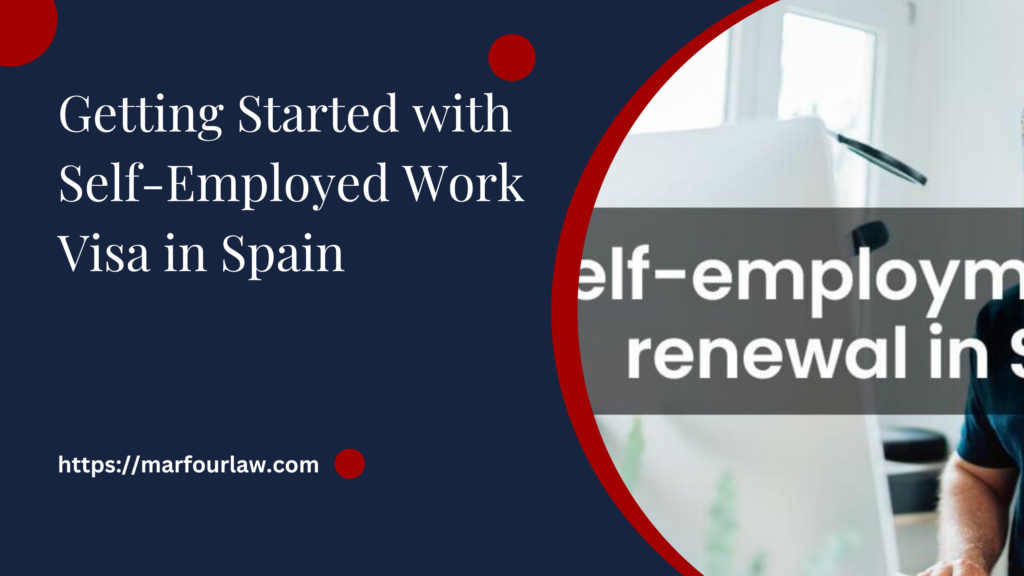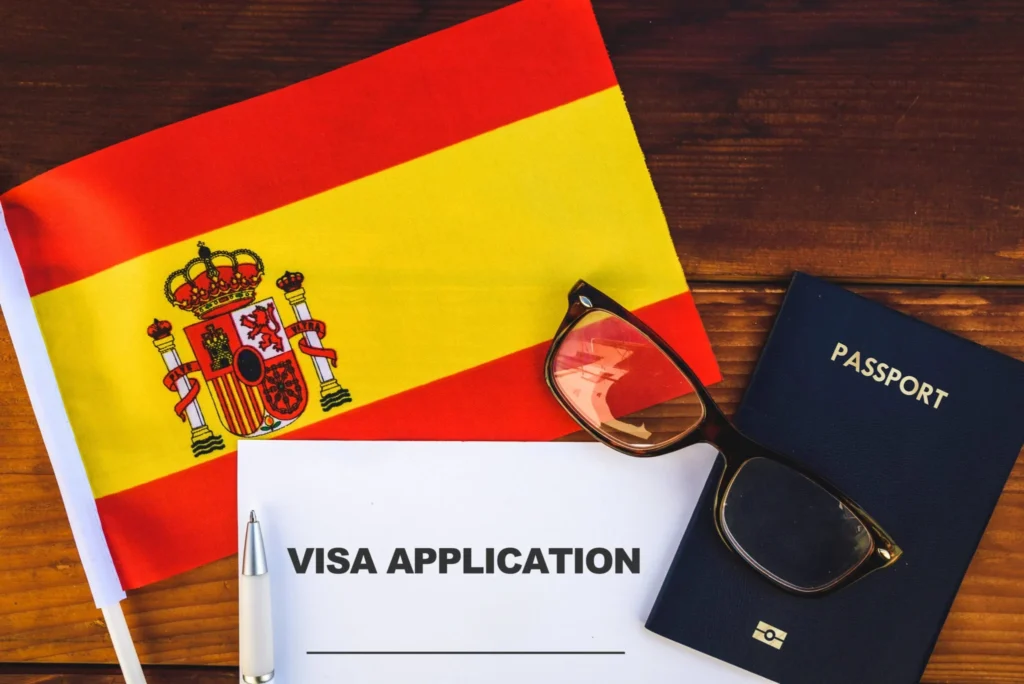Self-Employed Work Visa in Spain
Welcome to the journey of exploring a Self-Employed Work Visa in Spain! If you’ve been dreaming of a professional adventure in this vibrant country, then understanding the ins and outs of the Spain self-employed visa is your first step.

Whether you’re an entrepreneur, freelancer, or small business owner, the self-employed visa for Spain opens doors to endless opportunities in one of Europe’s most culturally rich and economically diverse nations.
Let’s delve into what it takes to obtain and thrive under the self-employed visa Spain offers.
Why Choose a Self-Employed Work Visa in Spain?
The self-employed visa for Spain provides a unique opportunity for entrepreneurs to establish and manage their businesses within the country. Whether you’re starting a tech startup, launching a creative agency, or offering consulting services, Spain’s self-employed visa allows you to pursue your entrepreneurial dreams in a supportive environment.
Freedom and Flexibility
One key benefit of holding a Self-Employed Work Visa in Spain is the freedom it offers. You have the flexibility to set your work schedule, choose your clients and projects, and work from virtually anywhere in the country. This flexibility is particularly appealing to freelancers and digital nomads who value independence and control over their work-life balance.
Access to the European Market
Spain’s membership in the European Union (EU) provides self-employed individuals with access to a vast consumer market spanning across Europe. This opens up opportunities for business expansion, collaboration with European partners, and leveraging the benefits of EU regulations and trade agreements.
Cultural Riches and Lifestyle
Living and working in Spain offers more than just business opportunities; it provides a rich cultural experience and a high quality of life. From the historic streets of Madrid and Barcelona to the serene beaches of Costa del Sol and the vibrant festivals throughout the year, Spain’s cultural diversity and Mediterranean lifestyle are major draws for expatriates and entrepreneurs alike.
Supportive Business Environment
Spain offers a supportive ecosystem for self-employed individuals, including networking opportunities, business incubators, and access to financial and legal resources. Organizations like chambers of commerce, business associations, and startup accelerators play a crucial role in connecting entrepreneurs with mentors, investors, and potential clients.
Tax Benefits
The Self-Employed Work Visa in Spain may come with tax advantages that make it attractive for new businesses and entrepreneurs. Spain offers various incentives and deductions for startups, including reduced corporate tax rates for small companies and exemptions for certain types of income.
Pathway to Residency
Successfully establishing yourself as a self-employed individual in Spain can lead to long-term residency and even citizenship opportunities. The self-employed visa is often a stepping stone for individuals who wish to settle permanently in Spain and enjoy the benefits of EU citizenship, such as freedom of movement within the Schengen Area.
Requirements for Self-Employed Work Visa in Spain
Meeting these requirements for a Self-Employed Work Visa in Spain will enhance your chances of a successful application and pave the way for starting your business venture in this dynamic European country.

Business Plan
A crucial requirement for the Spain self-employed visa is a comprehensive business plan. This document serves to outline your proposed business venture in Spain. The business plan should include the following elements:
- Business Description: A clear and concise description of your business idea, including the products or services you intend to offer.
- Market Analysis: Research and analysis of your target market in Spain, identifying potential customers and competitors.
- Financial Projections: Detailed financial forecasts for your business, including expected income, expenses, and profitability over the initial years of operation.
- Investment Plan: Outline how much capital you intend to invest in the business and where these funds will come from.
- Job Creation: If applicable, describe how your business will contribute to job creation in Spain.
A well-prepared business plan not only demonstrates your understanding of the market and feasibility of your business idea but also shows your commitment and preparedness to establish and run a successful business in Spain.
Financial Resources
To qualify for the Self-Employed Work Visa in Spain, you must demonstrate that you have sufficient financial resources to support yourself and your business venture. The specific amount required can vary depending on factors such as the nature of your business, expected expenses, and personal circumstances. Generally, you need to show proof of:
- Savings: Bank statements or other financial documents demonstrating a stable income or savings that can cover your living expenses and initial business costs in Spain.
- Investments: If you plan to finance your business through investments, provide documentation showing ownership of assets or investments that can be liquidated or utilized to fund your business in Spain.
Qualifications and Experience
Having relevant qualifications and experience in your field of business is essential. This helps substantiate your ability to operate your business in Spain successfully and contributes to the credibility of your visa application. Documentation to support your qualifications may include:
- Educational Certificates: Degrees, diplomas, or certifications relevant to your business field.
- Work Experience: Previous employment records or professional experience demonstrating your expertise in the industry.
- Professional Licenses: If your business requires specific licenses or certifications in Spain, ensure you have obtained or are in the process of obtaining these.
Legal Compliance
Ensure your business complies with all legal requirements in Spain. This includes:
- Business Registration: Register your business with the relevant authorities in Spain, such as the tax office (Agencia Tributaria) and social security office (Seguridad Social).
- Licenses and Permits: Obtaining any necessary licenses or permits required to operate your business in Spain legally. Requirements can vary depending on the nature of your business and location.
- Tax Obligations: Understanding and fulfilling your tax obligations as a self-employed individual in Spain, including income tax (IRPF) and VAT (IVA) if applicable.
Healthcare and Social Security
As a self-employed individual in Spain, you are responsible for arranging private healthcare coverage until you are eligible to enroll in the Spanish public healthcare system. You must also register with the Spanish social security system (Seguridad Social), which provides access to healthcare, pensions, and other social benefits.
Proof of Intent to Settle
To demonstrate your commitment to settling in Spain, provide evidence such as:
- Accommodation: Rental agreement or property ownership documents in Spain.
- Family Ties: If applicable, documentation showing family ties or relationships in Spain.
- Integration Plan: Outline your plans to integrate into Spanish society, such as learning the language or participating in community activities.
Application Process
The application process for the self-employed visa in Spain typically involves the following steps:
- Preparation: Gather all required documents, including your business plan, financial statements, proof of qualifications, and evidence of economic resources.
- Submission: Submit your visa application along with supporting documents to the Spanish consulate or embassy in your home country.
- Interview: In some cases, you may be required to attend an interview at the consulate to discuss your business plans and intentions in Spain.
- Decision: Await a decision on your visa application from the Spanish authorities. Once approved, you may be issued a visa allowing you to enter Spain and start your self-employed business.
By carefully preparing and meeting these requirements, you can enhance your chances of a successful application for a self-employed work visa in Spain. It’s advisable to consult with legal or immigration professionals familiar with Spanish visa procedures to ensure you fulfill all requirements and documentation accurately.
Benefits of Self-Employed Work Visa in Spain
Self-employment in Spain offers a range of benefits that appeal to entrepreneurs, freelancers, and small business owners. Here are some key advantages:

Flexibility and Autonomy
Self-employment provides the freedom to set your schedule and work on projects that align with your interests and skills. This flexibility allows you to balance work and personal life according to your preferences.
Entrepreneurial Opportunities
Spain’s vibrant economy and growing startup culture offer ample opportunities for entrepreneurs to innovate and launch new businesses. The country supports various industries, including technology, tourism, agriculture, and renewable energy, providing a diverse market for business ventures.
Tax Incentives
Self-employed individuals in Spain can benefit from tax deductions and incentives designed to support small businesses. These include deductions for business expenses, simplified tax reporting options, and incentives for research and development activities.
Access to European Markets
As a member of the European Union (EU), Spain provides access to a vast market of over 450 million consumers across Europe. This facilitates business expansion and opportunities for international collaboration and trade.
Social Security Benefits
Self-employed workers in Spain are entitled to social security coverage, which includes access to healthcare, maternity/paternity leave, pensions, and unemployment benefits. This safety net provides financial security and peace of mind for entrepreneurs and their families.
Cultural and Lifestyle Benefits
Spain’s rich cultural heritage, Mediterranean climate, and quality of life attract professionals seeking a balanced lifestyle. The country offers diverse landscapes, culinary delights, and a welcoming atmosphere conducive to creativity and personal growth.
Networking and Collaboration
Spain’s entrepreneurial ecosystem is supported by coworking spaces, startup incubators, and networking events that facilitate collaboration and knowledge-sharing among entrepreneurs. These connections can lead to partnerships, business opportunities, and professional growth.
Skill Development and Growth
Running a business in Spain encourages continuous learning and skill development. Entrepreneurs have the opportunity to refine their management, marketing, and negotiation skills while navigating the challenges and rewards of self-employment.
Economic Stability
Despite economic fluctuations, Spain remains a stable environment for business investment and growth. Government initiatives and EU funding support entrepreneurship, innovation, and sustainable development, enhancing financial stability for self-employed individuals.
Personal Fulfillment
For many self-employed individuals, the ability to pursue their passions and make a meaningful impact through their work is a significant benefit. Whether launching a startup, freelancing in a creative field, or providing specialized services, self-employment in Spain offers opportunities for personal fulfillment and professional success.
Overall, self-employment in Spain presents a rewarding pathway for individuals seeking independence, opportunity, and a vibrant business environment within the European Union.
Step-by-Step Guide to Applying for a Self-Employed Work Visa in Spain
Applying for a Self-Employed Work Visa in Spain involves several steps to ensure a smooth and successful process. Here’s a step-by-step guide:
Research Visa Requirements
Before applying, thoroughly research the specific requirements for the self-employed visa in Spain. Visit the official website of the Spanish consulate or embassy in your home country to understand the documentation, financial, and personal requirements.
Prepare Your Business Plan
Develop a detailed business plan outlining your proposed venture in Spain. Include information such as business description, market analysis, financial projections, and investment plans. Your business plan should demonstrate the viability and economic interest of your business in Spain.
Gather Required Documents
Collect all necessary documents for your visa application. Typical documents may include:
- Passport and passport-sized photos
- Completed visa application form
- Proof of sufficient financial resources
- Business plan (detailed and well-structured)
- Educational certificates and professional qualifications
- Health insurance coverage
- Criminal record certificate
- Evidence of accommodation in Spain (rental agreement or property ownership)
Ensure all documents are current, translated into Spanish if necessary, and organized according to the consulate’s requirements.
Register Your Business
Before applying for the visa, register your business with the Spanish tax office (Agencia Tributaria) and social security office (Seguridad Social). Obtain any required licenses or permits specific to your business activity.
Apply for Visa
Complete the visa application form accurately and submit it along with the required documents to the Spanish consulate or embassy in your home country. Pay the applicable visa fees and schedule any needed appointments, such as an interview.
Attend Interview (if required)
Some applicants may be asked to attend an interview at the consulate or embassy. Prepare to discuss your business plan, financial situation, and intentions in Spain clearly and confidently.
Await Decision
After submitting your application, await a decision from the Spanish authorities. Processing times can vary, so check with the consulate for estimated timelines. Once approved, you will receive a visa allowing you to enter Spain.
Travel to Spain
Upon receiving your visa, make travel arrangements to Spain within the visa validity period. Ensure you have sufficient funds for initial living expenses and business setup.
Register with Local Authorities
Within the first month of arrival in Spain, register with the local authorities (Oficina de Extranjeros) to obtain your Foreigner Identity Number (NIE). This number is necessary for conducting business and legal transactions in Spain.
Start Your Business
Once settled, commence operations of your self-employed business in accordance with Spanish laws and regulations. Maintain compliance with tax obligations, social security contributions, and any other legal requirements.
By following these steps diligently and seeking guidance from legal or immigration professionals when needed, you can navigate the process of applying for a self-employed visa in Spain successfully. Prepare thoroughly, stay organized, and embrace the opportunities that self-employment in Spain has to offer.
Top Industries for Self-Employed Work Visa in Spain
Self-Employed Work Visa in Spain spans various industries, each offering unique opportunities for entrepreneurial ventures. Here are some of the top sectors for self-employed workers in Spain:

Tourism and Hospitality
Spain is a top global tourism destination, attracting millions of visitors annually. Opportunities abound for self-employed individuals in sectors such as tour guiding, accommodation services (like vacation rentals), event planning, and culinary tourism.
Technology and Digital Services
The technology sector in Spain is growing rapidly, fueled by innovation and digital transformation. Self-employed workers can thrive in areas such as software development, web design, digital marketing, e-commerce consultancy, and IT support services.
Creative Arts and Media
Spain has a rich cultural heritage that supports creative industries such as graphic design, photography, filmmaking, music production, and content creation. Freelancers in these fields often find ample opportunities in both local and international markets.
Education and Language Services
As a popular destination for language learning, Spain offers opportunities for self-employed teachers and tutors specializing in language instruction (e.g., Spanish, English, and other languages), exam preparation (e.g., DELE, Cambridge exams), and academic tutoring.
Real Estate and Property Management
The Spanish real estate market attracts investors and property owners seeking management services. Self-employed workers can excel in property management, vacation rental management, real estate brokerage, and property renovation or maintenance services.
Health and Wellness
The wellness industry is thriving in Spain, with opportunities for self-employed professionals in sectors such as fitness training, yoga instruction, wellness coaching, nutrition consulting, holistic therapies, and alternative medicine practices.
Consulting and Professional Services
Consulting services are in demand across various sectors, including business strategy, financial advisory, legal consulting, human resources, and management consultancy. Self-employed consultants often serve small businesses, startups, and multinational companies.
Agriculture and Sustainable Practices
Spain’s diverse climate and fertile lands support agriculture, viticulture, and sustainable practices. Self-employed workers can engage in organic farming, agrotourism, vineyard management, agricultural consulting, and sustainable development projects.
Retail and Fashion
Spain is renowned for its fashion industry and vibrant retail sector. Self-employed individuals can pursue opportunities in fashion design, boutique ownership, online retailing, fashion consulting, and personal styling services.
Construction and Renovation
With ongoing urban development and infrastructure projects, Spain offers opportunities for self-employed workers in construction trades (e.g., carpentry, plumbing, electrical work), renovation services, interior design, and project management.
These industries reflect Spain’s economic diversity and entrepreneurial spirit, providing fertile ground for self-employed individuals to thrive and contribute to the country’s vibrant business landscape. Whether you’re a freelancer, entrepreneur, or small business owner, exploring these sectors can lead to rewarding opportunities in the Spanish market.
Maintaining Your Self-Employed Work Visa in Spain
Maintaining your Self-Employed Work Visa in Spain involves several key considerations to ensure legal compliance and sustainable business operations. Here are essential aspects to keep in mind:
Tax Compliance:
Regularly file your taxes with the Spanish tax office (Agencia Tributaria) through Marfour. Ensure timely submission of income tax (IRPF) and value-added tax (IVA), if applicable.
Social Security Contributions:
Pay your social security contributions (Seguridad Social) on time to access healthcare and other social benefits through Marfour. Monitor deadlines and contribution amounts closely.
Business Reporting:
With Marfour, maintain accurate financial records and prepare annual financial statements as required by Spanish law. This helps monitor business performance and comply with reporting obligations.
Renewal of Permits:
Monitor the expiration date of your self-employment permit or visa. Initiate the renewal process in advance through Marfour to prevent disruptions in your legal status.
Compliance with Regulations:
With Marfour, you can stay updated on changes in labor laws, business regulations, and industry-specific requirements and adapt your business practices to ensure ongoing compliance.
Visit Marfour for personalized advice and assistance tailored to your specific business needs. Learn more about effectively maintaining your self-employed status in Spain.
FAQs about Self-Employed Status in Spain

What are the minimum financial requirements for self-employment in Spain?
The specific financial requirements can vary, but generally, you need to demonstrate sufficient funds to support yourself and your business venture. This typically includes savings or investments that cover living expenses and initial business costs.
How do I register for social security as a self-employed individual in Spain?
You can register for social security (Seguridad Social) through the online portal or in person at the nearest Social Security office (Tesorería General de la Seguridad Social). You will need to choose a contribution base and make monthly contributions based on your income.
What taxes do self-employed individuals in Spain need to pay?
Self-employed individuals in Spain are required to pay income tax (IRPF) on their earnings and, if applicable, based on their business activities, Value Added Tax (IVA). Quarterly tax declarations (Modelo 130 for IRPF and Modelo 303 for VAT) must be submitted to the tax authorities.
Are there specific licenses or permits required for self-employed activities in Spain?
Yes, depending on your business activity, you may need to obtain specific licenses or permits from local authorities or regulatory bodies. It’s essential to research and comply with all legal requirements applicable to your industry.
How can I stay updated with regulatory changes and industry trends in Spain?
Stay informed by regularly checking official government websites, attending industry conferences, joining professional associations, and networking with peers in your field. Consulting with legal and tax advisors can also help you navigate regulatory changes effectively.
Conclusion
Maintaining Self-Employed Work Visa in Spain requires careful attention to tax obligations, social security contributions, legal compliance, and business management practices.
By fulfilling these responsibilities and staying proactive in your professional development, you can enjoy the benefits of entrepreneurship in Spain while contributing to its vibrant economy.
Whether you’re starting a new venture or expanding your existing business, thorough preparation and ongoing diligence are key to long-term success as a self-employed individual in Spain.
This type of work visa in Spain is ideal for non-EU citizens who wish to come to Spain to work as freelancers or set up a business.
Anyone can set up a business in Spain without any restrictions, our immigration lawyers can help you to set up your business and obtain your Self-Employed Visa in Spain (Autorización de residencia y trabajo por cuenta propia).
The first Spanish work visa is valid for one year. After the first year, the applicant can keep renewing their Spanish self-employed work permit every two years. To continue renewing the residence permit, the applicant must live in Spain and pay social security and taxes to the tax agency. After five years of residence in Spain, the applicant can apply for a Spanish permanent residence permit, known as the Long-Term Residence Permit (Tarjeta de Larga Duración).
obtained Work Visas
assisted Clients
%
satisfied clients
What are the main requirements for this Spanish Work Permit?
- To have a business plan.
- To have enough savings in order to run the business and to take care of its expenses.
- To be 18 years of age or older.
- To not have a criminal record.
- To have the licenses and local authorizations necessary for running the business.
- To have the necessary professional qualification and experience in order to run the planned business.
How I can get the Spanish Self-Employed Work Visa?
Once the applicant arrives in Spain, they have to enroll at the social security and the tax office as an Autonomo or AIE (impuesto sobre actividades economicas). Moreover, being self-employed requires having an accounting advisor (well known in Spanish as a gestor or asesoria) to correctly file your tax declarations and VAT declarations.
Finally, the applicant has one month in order to get their fingerprints taken for obtaining their TIE-Foreigner Residence Card.
Our English-speaking immigration lawyer in Spain can assist you throughout the entire process. We will guide you through all stages, including drafting your business plan, handling your self-employment application, managing your accounting, and registering with social security.
What does this service include?
- Tailored legal advice.
- Guidance on gathering the necessary documents.
- Dealing and arranging the meetings with the Spanish authorities on behalf of the client.
- Direct contact with the Spanish Consulate.
- Assist with translating the documents into Spanish.
- Drafting your business plan.
- Following the application until its resolution.
- Assisting with the registration at the Spanish City Council.
- Preparing of the corresponding forms and administration fee.
- Assisting with arranging a meeting with the police in Spain to obtain the TIE Card.

Do You Need To Renew Your Self-Emloyed Work Authorization In Spain?
Marfour International Law Firm has the right immigration lawyers to assist you with renewing your Spanish work authorization.
If your card is expiring soon, you should start gathering the necessary documents to submit the renewal during the 60 days before the card expiration date or 90 days after the card expires.
work permits renewed
%
satisfied clients
What are the main requirements to renew my Self-Employed Work Authorization in Spain?
- Maintain the same situation that warranted the authorization or
- Qualify as a beneficiary of protection due to termination of activity.
- Additionally, ensure there are no outstanding debts with the social security or tax agency.
How can I submit the renewal of my Self-Employed Work Visa in Spain?
The application can be submitted by your Spanish immigration lawyer on your behalf to the immigration office of you city.
The administration has up to three months to issue a resolution. If the application is not resolved within three months from the submission date, it is understood to have been approved by virtue of the positive silence principle of the administration.
After the approval of your renewal, the applicant will proceed with the application of the TIE-card.
testimonials
![]()
It was very complicated to move my company from UK to Spain. Although it is long process, they knew very well how to handle the process during each step. They drafted an exception business plan for me. I highly recommend Marfour team for self-employed visa application and set up a company in Spain. Thank you very much for making the process easier and simple.
![]()
MARFOUR IS READY TO ASSIST YOU WITH YOUR SPANISH SELF-EMPLOYED WORK PERMIT
Contact us, and Marfour International Law Firm will assist you in obtaining your Self-Employed Work Visa in Spain. One of our specialized English Speaking Lawyers will contact you immediately to help and advise. Do not hesitate to send us your enquiry.

